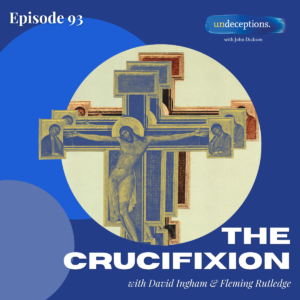As we approach to Easter, Christians and sceptics alike are turning their attention to the crucifixion of Jesus Christ – one of the most controversial events in history.
In an interview on a British talk show several years ago, Richard Dawkins referred to the Christian doctrine of the crucifixion as “disgusting” and a “horrible idea”.
“Given that the judge is all-powerful (and) has the power to forgive if he wants … what an incredibly unpleasant way to do it if you have the power to forgive,” he said.
In his novel The God Delusion, Dawkins went one step further;
“I have described atonement, the central doctrine of Christianity, as vicious, sadomasochistic and repellent. We should also dismiss it as barking mad, but for its ubiquitous familiarity which has dulled our objectivity. If God wanted to forgive our sins, why not just forgive them, without having himself tortured and executed in payment. . . ?”
Dawkins would go on to call the God of the Bible “filicidal” – that is, a murderer of his own child.
While Dawkins’ combative nature (in certain mediums) may have at times derailed debate, his objections to the notion of the crucifixion are understandable.
What Dawkins – and countless others – take objection to is the theory of Penal Substitutionary Atonement (PSA) – that Christ, voluntarily submitting to God the Father’s plan, was punished in the place of sinners, thus satisfying the demands of justice so God could justly forgive sins.
Check out Dawkins’ objections to the crucifixion below
PSA raises some pressing questions; what kind of a God would give up his own innocent child to die a hideous death at the hands of Roman soldiers, all for the sake of the guilty party?
Does this make God a murderer?
A grave misunderstanding
Theologian and author Rev. Fleming Rutledge – the brains behind the acclaimed The Crucifixion: Understanding the Death of Jesus Christ – said viewing God in this light was a “gigantic mistake, (which is) actually quite easy to correct”.
“It’s just really pathetically sad that we ever got into this way of thinking,” she said, speaking with John Dickson on the Undeceptions podcast.
“Jesus is not some victim being sacrificed by a sadistic father. Jesus is the second person of the blessed Trinity (and) the Trinity is acting all as one.
“God is dying there, the Holy Spirit is part of this … Jesus is dying as part of the Godhead. He and the Father and the Spirit are doing this together from the beginning of all creation.
“There are three persons sharing love within themselves, and these three persons together are sacrificing. Is God sacrificing God? Well, in a sense, yes.”

Pilgrims in Jerusalem carry a replica crucifix down the Via Delerosa (the stations of the cross) on Good Friday
Rutledge said to appreciate the gravity of the crucifixion properly, the church had to present a clearer picture of Jesus, not just as an exalted man, but as God Himself.
“Not everyone can understand the depths of meaning of (this) unless the church does a better job of teaching it,” she said.
“It is not so difficult, I think, to understand that Jesus was a human being, like the rest of us … he was thirsty, he was hungry, he got tired, he got angry, he got frustrated. He didn’t always know the right answer right away. He struggled with temptation. He struggled with loneliness. He struggled with exhaustion. He struggled with not understanding always what it was he was supposed to do.”
The ultimate victory
Rather than being depicted as a tragic event involving God unwillingingly paying an awful price, Rutledge urges us to remember a key theme taught by the early church about the crucifixion – Christs’ ultimate victory over sin; Christus Victor.
This was a huge concept for the first Christians. Rather than seeing Jesus’ death on a cross as a humiliation – which was the point of such a punishment – the first believers saw Jesus’ ordeal as a triumph. The price for sin had been paid, once and for all, by God Himself.
“When you were dead in your sins and in the uncircumcision of your flesh, God made you alive with Christ. He forgave us all our sins, having cancelled the charge of our legal indebtedness, which stood against us and condemned us; he has taken it away, nailing it to the cross. And having disarmed the powers and authorities, he made a public spectacle of them, triumphing over them by the cross.”
Colossians 2: 13-15
“Jesus on the cross was the conqueror, the one who passes through death into victorious eternal life, and brings us with him,” said Rutledge.
PSA was actually a means to a victory, not a means to a grizzly end.
“I always felt that I knew and could depend on the idea that Jesus had died for me personally,” said Rutledge.
“And he also had died for every other human being personally. I didn’t really see any contradiction there. If He died for all then he died for me.
“To know God, to know God’s perfections, to know God’s infinite greatness and mercy, to know God’s creative power, to know the God of the Old Testament and the New Testament is to know God’s righteousness.
“Jesus substituted himself for us. He the one who is truly righteous, the only one who is truly righteous, put himself in our place, becoming sin, becoming the personification of sin and absorbing sin into himself so that we might become righteous as he is righteous.
“Now, if that’s not substitution, I don’t know what it is.”
Adapted by Alasdair Belling from ‘The Crucifixion‘, on the Undeceptions podcast.

Want to be further undeceived?
Check out our network of podcasts and articles in the Undeceptions Library.











































